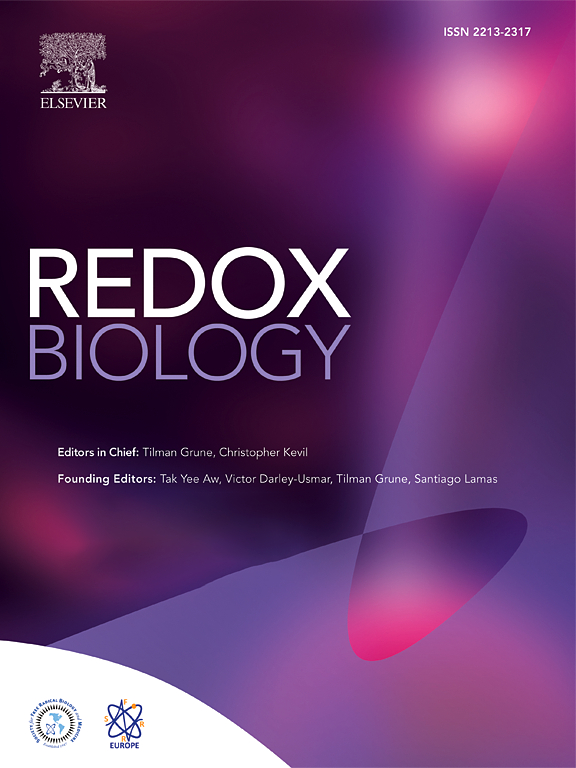抗坏血酸缺乏促进代谢重塑和肺纤维化,导致Sod1和Akr1a双敲除小鼠呼吸衰竭
IF 11.9
1区 生物学
Q1 BIOCHEMISTRY & MOLECULAR BIOLOGY
引用次数: 0
摘要
我们最近报道了编码超氧化物歧化酶1 (Sod1)和编码醛还原酶Akr1a的双敲除(DKO)小鼠在补充抗坏血酸(Asc)(饮用水中1.5 mg/ml)后存活超过一年,并且Asc的停药仅在两周内因氧化损伤相关肺炎导致过早死亡。已知SOD1可以使超氧化物的自由基电子失效,从而抑制随后形成的高活性氧(ROS)。Akr1a编码醛还原酶,该酶催化Asc的生物合成,Asc是一种强营养抗氧化剂。在这项研究中,我们试图深入了解DKO小鼠呼吸衰竭进展的代谢基础。病理检查显示这些小鼠的肺细胞死亡升高引起肺损伤和纤维化进展。代谢物分析表明,在三羧酸循环中分解的底物化合物从碳水化合物转变为氨基酸,从而导致多胺合成。肺中参与细胞极化、粘附和运输的蛋白质增加,表现出与活化的白细胞相似的趋势,而肺中的抗氧化酶则明显减少。DKO小鼠的羰基蛋白含量最初很高,但停用Asc后并没有增加,这可能是由于泛素-蛋白酶体系统刺激氧化蛋白降解所致。可以想象,在Sod1缺乏的情况下,由于Asc不足引起的氧化损伤导致蛋白质氧化,随后降解,从而为三羧酸循环提供燃料。重塑氨基酸使用的代谢途径会增加多胺的合成,从而刺激肺纤维化并导致呼吸衰竭。本文章由计算机程序翻译,如有差异,请以英文原文为准。

Ascorbic acid deficiency promotes metabolic remodeling and pulmonary fibrosis that leads to respiratory failure in Sod1 and Akr1a double-knockout mice
We recently reported that mice with a double knockout (DKO) of Sod1 encoding superoxide dismutase 1 (SOD1) and Akr1a encoding aldehyde reductase survived more than one year when supplemented with ascorbic acid (Asc) (1.5 mg/ml in drinking water), and that the withdrawal of Asc resulted in premature death in only two weeks due to oxidative damage-associated pneumonia. SOD1 is known to disable the radical electrons of superoxide, which suppresses the subsequent formation of highly reactive oxygen species (ROS). Akr1a encodes aldehyde reductase, which catalyzes the biosynthesis of Asc, which is a strong nutritional antioxidant. In this study, we sought to gain insight into the metabolic basis for the progression of respiratory failure in the DKO mice. Pathological examinations have revealed pulmonary damage and the progression of fibrosis caused by an elevation in pulmonary cell death in these mice. Metabolite analyses have shown that substrate compounds catabolized in the tricarboxylic acid cycle are shifted from carbohydrates to amino acids, which leads to polyamine synthesis. While proteins involved in cell polarization, adhesion, and transport are increased in the lungs, showing trends similar to those of activated leukocytes, antioxidative enzymes were characteristically decreased in the lungs. Carbonyl proteins were originally high in the DKO mice but did not increase following Asc withdrawal, which was likely caused by stimulation of the degradation of oxidized proteins through the ubiquitin-proteasome system. It is conceivable that the oxidative insult due to Asc insufficiency under Sod1 deficiency causes protein oxidation followed by degradation, which fuels the tricarboxylic acid cycle. Remodeling the metabolic pathways for amino acid use increases polyamine synthesis, which could stimulate pulmonary fibrosis and lead to respiratory failure.
求助全文
通过发布文献求助,成功后即可免费获取论文全文。
去求助
来源期刊

Redox Biology
BIOCHEMISTRY & MOLECULAR BIOLOGY-
CiteScore
19.90
自引率
3.50%
发文量
318
审稿时长
25 days
期刊介绍:
Redox Biology is the official journal of the Society for Redox Biology and Medicine and the Society for Free Radical Research-Europe. It is also affiliated with the International Society for Free Radical Research (SFRRI). This journal serves as a platform for publishing pioneering research, innovative methods, and comprehensive review articles in the field of redox biology, encompassing both health and disease.
Redox Biology welcomes various forms of contributions, including research articles (short or full communications), methods, mini-reviews, and commentaries. Through its diverse range of published content, Redox Biology aims to foster advancements and insights in the understanding of redox biology and its implications.
 求助内容:
求助内容: 应助结果提醒方式:
应助结果提醒方式:


